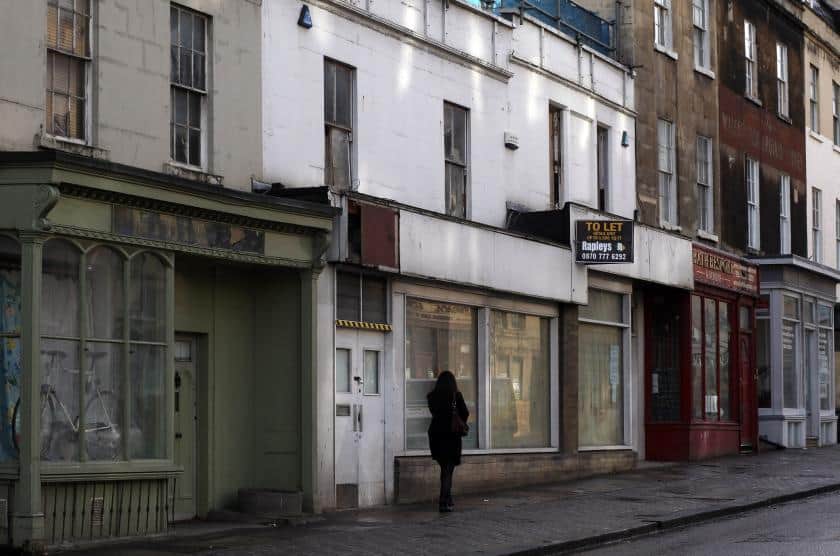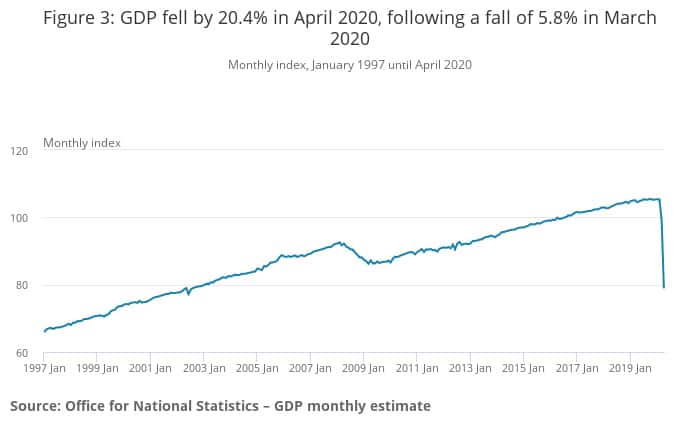GDP slumps by 20.4% in April as lockdown takes its toll on UK economy
The latest official figures from the Office for National Statistics (ONS) has revealed gross domestic product (GDP) fell by 10.4 per cent in the three months to April, with April itself being a particularly difficult month for companies.
GDP, the measure of the value of goods and services produced in the UK which acts as an estimate of the size of and growth in the economy, dropped by 20.4 per cent in April compared to March.
Fuelled by the introduction of restrictions to movement across the UK, which began on the 23rd of March, April’s fall is the largest monthly fall in GDP in the UK’s history.
Jonathan Athow, Deputy National Statistician for Economic Statistics, said: “April’s fall in GDP is the biggest the UK has ever seen, more than three times larger than last month and almost ten times larger than the steepest pre-covid-19 fall. In April the economy was around 25% smaller than in February.
“Virtually all areas of the economy were hit, with pubs, education, health and car sales all giving the biggest contributions to this historic fall.”
According to the ONS data, wholesale and retail trade and repair of motor vehicles and motorcycles fell by an unprecedented 41.6 per cent whilst retail trade dropped by 8.9 per cent as many retailers temporarily ceased trading in April.
“Manufacturing and construction also saw significant falls, with manufacture of cars and housebuilding particularly badly affected,” continued Athow.
“The UK’s trade with the rest of the world was also badly affected by the pandemic, with large falls in both the import and export of cars, fuels, works of art and clothing.”
Given the lockdown measures, a sharp decline had been predicted by analysts and a poll by Reuters had predicted a decline of 18.4 per cent.
Commenting on the figures, Chancellor Rishi Sunak said: “In line with many other economies around the world, coronavirus is having a severe impact on our economy.
“The lifelines we’ve provided with our furlough scheme, grants, loans and tax cuts have protected thousands of businesses and millions of jobs – giving us the best chance of recovering quickly as the economy reopens.
“We’ve set out our plan to gradually and safely reopen the economy. Next week, more shops on the high street will be able to open again as we start to get our lives a little bit more back to normal.”
All eyes will be on retail stores from next Monday to see the level of consumer confidence to return to stores and start spending again.
Many retail leaders are hoping for a quick bounce back, fuelled by pent up demand over the past three months. Some commenters have warned that this may not be the case and a slower recovery may be on the cards as much of the population remain on furlough and face an uncertain financial future.
https://thiis.co.uk/gdp-slumps-by-20-4-in-april-as-lockdown-takes-its-toll-on-uk-economy/https://thiis.co.uk/wp-content/uploads/2020/06/Figure-3_-GDP-April-fall.jpghttps://thiis.co.uk/wp-content/uploads/2020/06/Figure-3_-GDP-April-fall-150x150.jpgCoronavirus NewsCOVID-19 Sector NewsGovernment & Local AuthoritiesNewsroomReports & ResearchSector Newsfurlough,GDP,gross domestic product,lockdown,ONS,retail reopenThe latest official figures from the Office for National Statistics (ONS) has revealed gross domestic product (GDP) fell by 10.4 per cent in the three months to April, with April itself being a particularly difficult month for companies. GDP, the measure of the value of goods and services produced in...Calvin BarnettCalvin Barnettcalvin.barnett@bhta.comAuthorTHIIS Magazine



